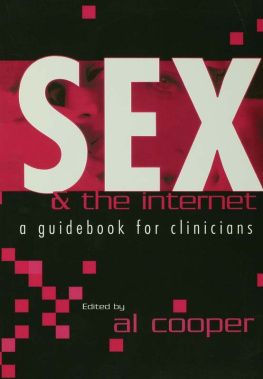Published in 2002 by
Routledge
29 West 35th Street
New York, NY 10001
www.routledge-ny.com
Published in Great Britain by
Routledge
11 New Fetter Lane
London EC4P 4EE
Routledge is an imprint of the Taylor & Francis Group.
Copyright 2002 by Routledge.
All rights reserved. No part of this book may be reprinted or reproduced or utilized in any form or by any electronic, mechanical, or other means, now known or hereafter invented, including photocopying and recording, or in any information storage or retrieval system, without written permission from the publishers.
10 9 8 7 6 5 4 3
Library of Congress Cataloging-in-Publication Data
Cunningham, John Christopher, 1964
Race-ing masculinity: identity in contemporary U. S. mens writing / by John Christopher Cunningham
p. cm. (American popular history and culture)
Includes bibliographical references and index.
ISBN 978-0-4159-3476-3
1. American literatureMale authors-History and criticism. 2. American literature20th centuryHistory and criticism. 3. Identity (Psychology) in literature. 4. Masculinity in literature. 5. Race in literature. 6. Men in literature. I. Title: Identity in contemporary U.S. mens writing. II. Title: identity in contemporary United States mens writing. III. Title. IV. garland studies in American popular history and culture.
PS153.M3 C86 2002
810.9353dc21
2002017784
C HAPTER O NE
Introduction:
Literature as a Site for the Constitution and Reconfiguration of Identity
The following book consists of a set of essays on contemporary U.S. male writers. My focus on male writers grew out of the concern, expressed by a number of male writers of color, that their voices were being systematically silenced. Ishmael Reed and Frank Chin, for example, have argued that support for the writing of women of color by academia and the publishing industry constitutes a White supremacist attempt to silence men of color. While I do believe that, in a college literature course, one is more likely to read something by Toni Morrison, Maxine Hong Kingston, Leslie Marmon Silko, or Sandra Cisneros than anything by a contemporary male African American, Asian American, American Indian or Chicano/Latino writer, I dont believe Reeds and Chins diagnosis is correct. What seems more likely is that the presence in most English Departments of a strong feminist sensibility has raised interest in women-authored texts and has created reservations about arguably sexist texts by writers like Reed and Chin. If, however, it is true that the voices of contemporary men of color are less frequently taught in literature courses, for whatever reason, I believe it is necessary to explore why, committed as I am to a pluralist pedagogy.
I examine work by male writers not to find out what real men think and feel, but to see how literature by men represents them. Literature is one mode of writing among many putting forward ideas about what men have been and what they can be. In its highly crafted form, it offers an ideal site for the generation and dissemination of ideas about gender and race. It also offers a particularly clear arena for the kinds of articulations and rearticulations through which identity is produced and changed.
I draw my position on the constitution of identity from the work of selfdefined post-Marxist cultural critics, Chantal Mouffe and Ernesto Laclau. In their writings, together and separately, Laclau and Mouffe lay out a theory of radical democracy based on the notion that the political world functions through the constant rearticulation of blocs of identity: a It is the process of interpellation or hailing that will take a central place in all of Laclaus later work.
Althussers well-known early piece, Ideology and Ideological State Apparatuses, begins a search for the ideological by first distinguishing between concrete individuals on the one hand and concrete subjects on the other. He explains:
ideology acts or functions in such a way that it recruits subjects among the individuals (it recruits them all), or transforms the individuals into subjects (it transforms them all) by that very precise operation which I have called interpellation or hailing. (I, 174)
It is in this sense that Althusser claims that the existence of ideology and the hailing or interpellation of individuals as subjects are one and the same thing (I,175).
The term individual here refers not to a position of total undifferentiation, but to that of a person existing within structures of differentiation, but who is, in a sense, unconscious of them, or, unselfconscious. A state of actual undifferentiation is only an abstract, theoretical position, since distinguishing categories pre-exist all persons. What is important and new in Althussers argument is his claim that the second positionthat of subjectivityis similarly abstract. Althusser writes:
ideology has always-already interpellated individuals as subjects, which amounts to making it clear that individuals are alwaysalready interpellated by ideology as subjects, which necessarily leads us to one last proposition: individuals are always-already subjects. Hence individuals are abstract with respect to the subjects which they always-already are. (I,1756)
Althusser demonstrates by example how this proposition functions:
an individual is always-already a subject, even before he is bornit is certain in advance that it will bear its Fathers Name, and will therefore have an identity and be irreplaceable. Before its birth, the child is therefore always-already a subject, appointed as a subject in and by the specific familial ideological configuration in which it is expected once it has been conceived. (I,176)
In the end, Althusser offers the binary, individual/subject, only to deconstruct it as a starting point for conceptualizing subjectivity in a way which asserts the ultimate social constructedness of identity: there is no individual or subject before socialization.






